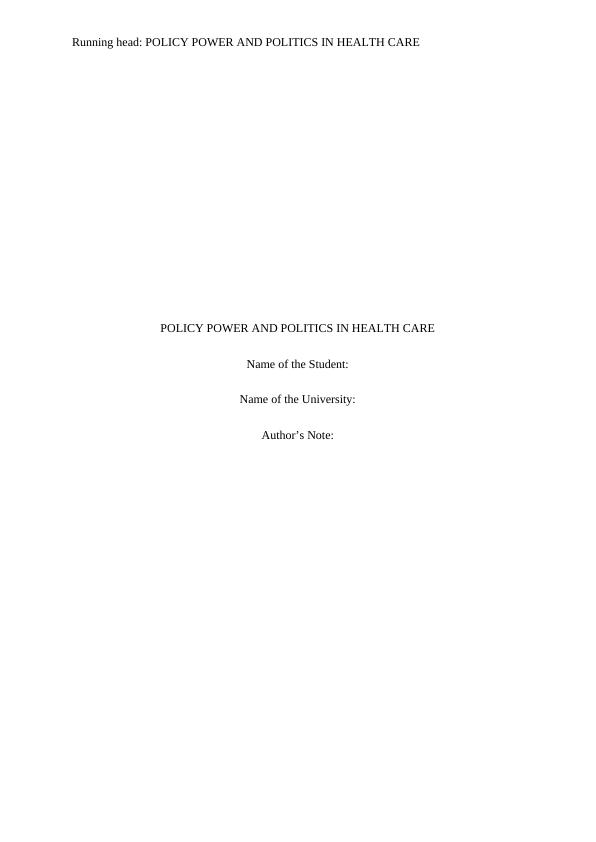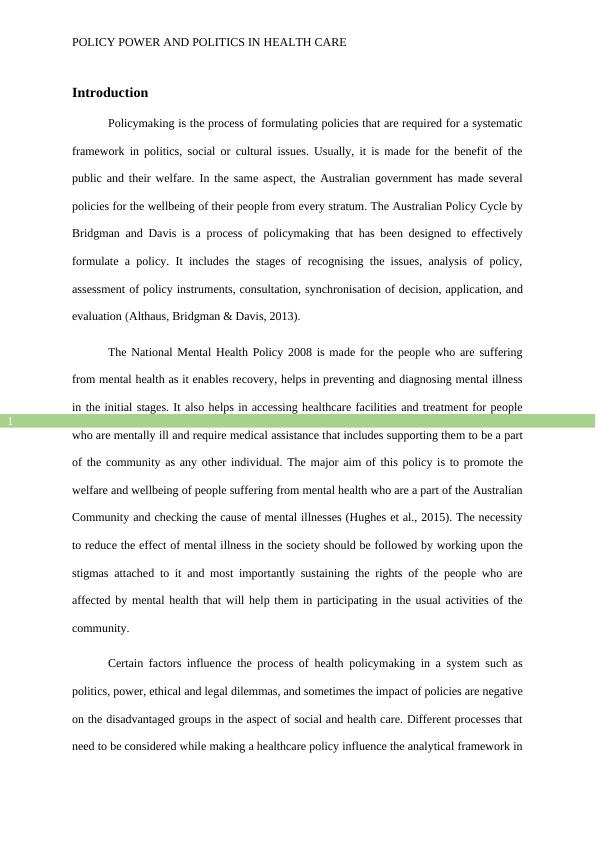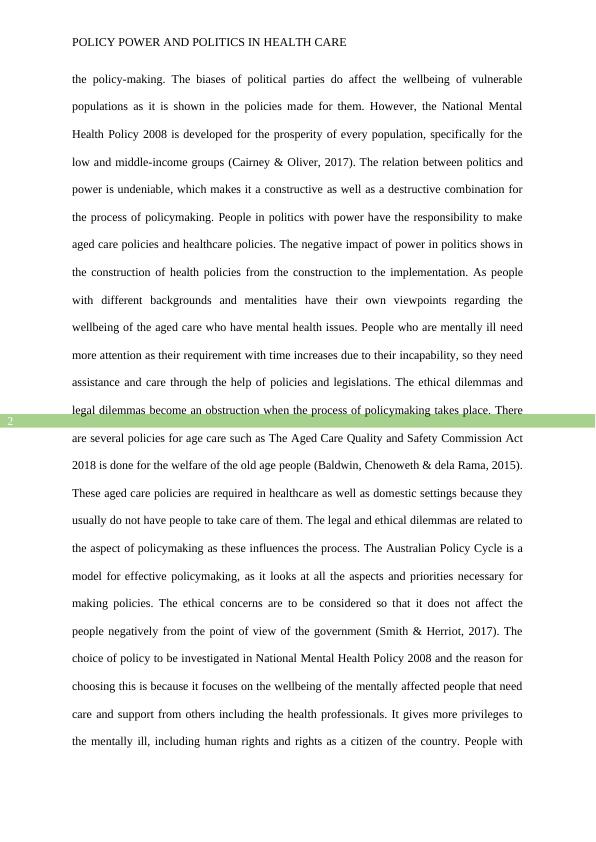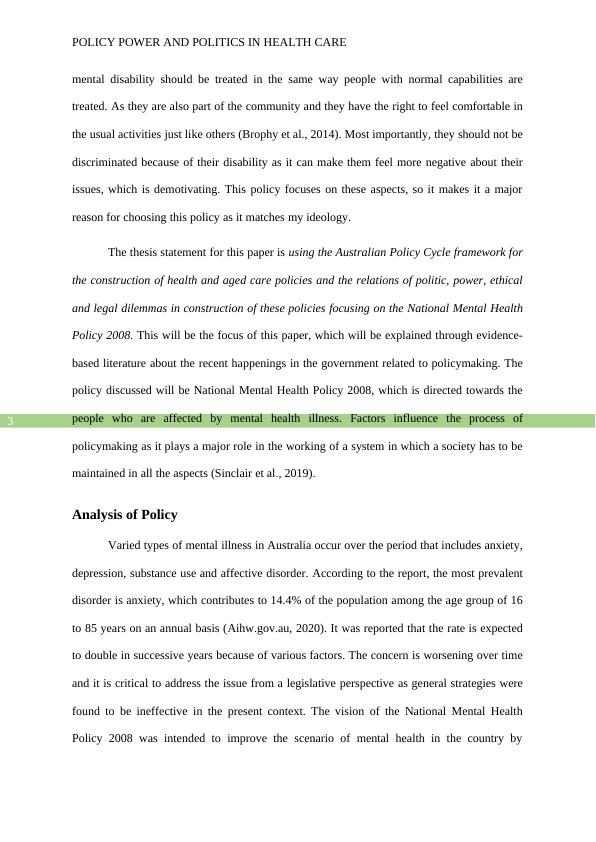Policy Power and Politics in Healthcare | Report
Added on 2022-08-08
14 Pages4583 Words48 Views
Running head: POLICY POWER AND POLITICS IN HEALTH CARE
POLICY POWER AND POLITICS IN HEALTH CARE
Name of the Student:
Name of the University:
Author’s Note:
POLICY POWER AND POLITICS IN HEALTH CARE
Name of the Student:
Name of the University:
Author’s Note:

1
POLICY POWER AND POLITICS IN HEALTH CARE
Introduction
Policymaking is the process of formulating policies that are required for a systematic
framework in politics, social or cultural issues. Usually, it is made for the benefit of the
public and their welfare. In the same aspect, the Australian government has made several
policies for the wellbeing of their people from every stratum. The Australian Policy Cycle by
Bridgman and Davis is a process of policymaking that has been designed to effectively
formulate a policy. It includes the stages of recognising the issues, analysis of policy,
assessment of policy instruments, consultation, synchronisation of decision, application, and
evaluation (Althaus, Bridgman & Davis, 2013).
The National Mental Health Policy 2008 is made for the people who are suffering
from mental health as it enables recovery, helps in preventing and diagnosing mental illness
in the initial stages. It also helps in accessing healthcare facilities and treatment for people
who are mentally ill and require medical assistance that includes supporting them to be a part
of the community as any other individual. The major aim of this policy is to promote the
welfare and wellbeing of people suffering from mental health who are a part of the Australian
Community and checking the cause of mental illnesses (Hughes et al., 2015). The necessity
to reduce the effect of mental illness in the society should be followed by working upon the
stigmas attached to it and most importantly sustaining the rights of the people who are
affected by mental health that will help them in participating in the usual activities of the
community.
Certain factors influence the process of health policymaking in a system such as
politics, power, ethical and legal dilemmas, and sometimes the impact of policies are negative
on the disadvantaged groups in the aspect of social and health care. Different processes that
need to be considered while making a healthcare policy influence the analytical framework in
POLICY POWER AND POLITICS IN HEALTH CARE
Introduction
Policymaking is the process of formulating policies that are required for a systematic
framework in politics, social or cultural issues. Usually, it is made for the benefit of the
public and their welfare. In the same aspect, the Australian government has made several
policies for the wellbeing of their people from every stratum. The Australian Policy Cycle by
Bridgman and Davis is a process of policymaking that has been designed to effectively
formulate a policy. It includes the stages of recognising the issues, analysis of policy,
assessment of policy instruments, consultation, synchronisation of decision, application, and
evaluation (Althaus, Bridgman & Davis, 2013).
The National Mental Health Policy 2008 is made for the people who are suffering
from mental health as it enables recovery, helps in preventing and diagnosing mental illness
in the initial stages. It also helps in accessing healthcare facilities and treatment for people
who are mentally ill and require medical assistance that includes supporting them to be a part
of the community as any other individual. The major aim of this policy is to promote the
welfare and wellbeing of people suffering from mental health who are a part of the Australian
Community and checking the cause of mental illnesses (Hughes et al., 2015). The necessity
to reduce the effect of mental illness in the society should be followed by working upon the
stigmas attached to it and most importantly sustaining the rights of the people who are
affected by mental health that will help them in participating in the usual activities of the
community.
Certain factors influence the process of health policymaking in a system such as
politics, power, ethical and legal dilemmas, and sometimes the impact of policies are negative
on the disadvantaged groups in the aspect of social and health care. Different processes that
need to be considered while making a healthcare policy influence the analytical framework in

2
POLICY POWER AND POLITICS IN HEALTH CARE
the policy-making. The biases of political parties do affect the wellbeing of vulnerable
populations as it is shown in the policies made for them. However, the National Mental
Health Policy 2008 is developed for the prosperity of every population, specifically for the
low and middle-income groups (Cairney & Oliver, 2017). The relation between politics and
power is undeniable, which makes it a constructive as well as a destructive combination for
the process of policymaking. People in politics with power have the responsibility to make
aged care policies and healthcare policies. The negative impact of power in politics shows in
the construction of health policies from the construction to the implementation. As people
with different backgrounds and mentalities have their own viewpoints regarding the
wellbeing of the aged care who have mental health issues. People who are mentally ill need
more attention as their requirement with time increases due to their incapability, so they need
assistance and care through the help of policies and legislations. The ethical dilemmas and
legal dilemmas become an obstruction when the process of policymaking takes place. There
are several policies for age care such as The Aged Care Quality and Safety Commission Act
2018 is done for the welfare of the old age people (Baldwin, Chenoweth & dela Rama, 2015).
These aged care policies are required in healthcare as well as domestic settings because they
usually do not have people to take care of them. The legal and ethical dilemmas are related to
the aspect of policymaking as these influences the process. The Australian Policy Cycle is a
model for effective policymaking, as it looks at all the aspects and priorities necessary for
making policies. The ethical concerns are to be considered so that it does not affect the
people negatively from the point of view of the government (Smith & Herriot, 2017). The
choice of policy to be investigated in National Mental Health Policy 2008 and the reason for
choosing this is because it focuses on the wellbeing of the mentally affected people that need
care and support from others including the health professionals. It gives more privileges to
the mentally ill, including human rights and rights as a citizen of the country. People with
POLICY POWER AND POLITICS IN HEALTH CARE
the policy-making. The biases of political parties do affect the wellbeing of vulnerable
populations as it is shown in the policies made for them. However, the National Mental
Health Policy 2008 is developed for the prosperity of every population, specifically for the
low and middle-income groups (Cairney & Oliver, 2017). The relation between politics and
power is undeniable, which makes it a constructive as well as a destructive combination for
the process of policymaking. People in politics with power have the responsibility to make
aged care policies and healthcare policies. The negative impact of power in politics shows in
the construction of health policies from the construction to the implementation. As people
with different backgrounds and mentalities have their own viewpoints regarding the
wellbeing of the aged care who have mental health issues. People who are mentally ill need
more attention as their requirement with time increases due to their incapability, so they need
assistance and care through the help of policies and legislations. The ethical dilemmas and
legal dilemmas become an obstruction when the process of policymaking takes place. There
are several policies for age care such as The Aged Care Quality and Safety Commission Act
2018 is done for the welfare of the old age people (Baldwin, Chenoweth & dela Rama, 2015).
These aged care policies are required in healthcare as well as domestic settings because they
usually do not have people to take care of them. The legal and ethical dilemmas are related to
the aspect of policymaking as these influences the process. The Australian Policy Cycle is a
model for effective policymaking, as it looks at all the aspects and priorities necessary for
making policies. The ethical concerns are to be considered so that it does not affect the
people negatively from the point of view of the government (Smith & Herriot, 2017). The
choice of policy to be investigated in National Mental Health Policy 2008 and the reason for
choosing this is because it focuses on the wellbeing of the mentally affected people that need
care and support from others including the health professionals. It gives more privileges to
the mentally ill, including human rights and rights as a citizen of the country. People with

3
POLICY POWER AND POLITICS IN HEALTH CARE
mental disability should be treated in the same way people with normal capabilities are
treated. As they are also part of the community and they have the right to feel comfortable in
the usual activities just like others (Brophy et al., 2014). Most importantly, they should not be
discriminated because of their disability as it can make them feel more negative about their
issues, which is demotivating. This policy focuses on these aspects, so it makes it a major
reason for choosing this policy as it matches my ideology.
The thesis statement for this paper is using the Australian Policy Cycle framework for
the construction of health and aged care policies and the relations of politic, power, ethical
and legal dilemmas in construction of these policies focusing on the National Mental Health
Policy 2008. This will be the focus of this paper, which will be explained through evidence-
based literature about the recent happenings in the government related to policymaking. The
policy discussed will be National Mental Health Policy 2008, which is directed towards the
people who are affected by mental health illness. Factors influence the process of
policymaking as it plays a major role in the working of a system in which a society has to be
maintained in all the aspects (Sinclair et al., 2019).
Analysis of Policy
Varied types of mental illness in Australia occur over the period that includes anxiety,
depression, substance use and affective disorder. According to the report, the most prevalent
disorder is anxiety, which contributes to 14.4% of the population among the age group of 16
to 85 years on an annual basis (Aihw.gov.au, 2020). It was reported that the rate is expected
to double in successive years because of various factors. The concern is worsening over time
and it is critical to address the issue from a legislative perspective as general strategies were
found to be ineffective in the present context. The vision of the National Mental Health
Policy 2008 was intended to improve the scenario of mental health in the country by
POLICY POWER AND POLITICS IN HEALTH CARE
mental disability should be treated in the same way people with normal capabilities are
treated. As they are also part of the community and they have the right to feel comfortable in
the usual activities just like others (Brophy et al., 2014). Most importantly, they should not be
discriminated because of their disability as it can make them feel more negative about their
issues, which is demotivating. This policy focuses on these aspects, so it makes it a major
reason for choosing this policy as it matches my ideology.
The thesis statement for this paper is using the Australian Policy Cycle framework for
the construction of health and aged care policies and the relations of politic, power, ethical
and legal dilemmas in construction of these policies focusing on the National Mental Health
Policy 2008. This will be the focus of this paper, which will be explained through evidence-
based literature about the recent happenings in the government related to policymaking. The
policy discussed will be National Mental Health Policy 2008, which is directed towards the
people who are affected by mental health illness. Factors influence the process of
policymaking as it plays a major role in the working of a system in which a society has to be
maintained in all the aspects (Sinclair et al., 2019).
Analysis of Policy
Varied types of mental illness in Australia occur over the period that includes anxiety,
depression, substance use and affective disorder. According to the report, the most prevalent
disorder is anxiety, which contributes to 14.4% of the population among the age group of 16
to 85 years on an annual basis (Aihw.gov.au, 2020). It was reported that the rate is expected
to double in successive years because of various factors. The concern is worsening over time
and it is critical to address the issue from a legislative perspective as general strategies were
found to be ineffective in the present context. The vision of the National Mental Health
Policy 2008 was intended to improve the scenario of mental health in the country by

End of preview
Want to access all the pages? Upload your documents or become a member.
Related Documents
Policy Analysis of Mental Health | Studylg...
|8
|1917
|14
Policy Development and Powerlg...
|8
|1907
|370
Policy Power and Politics in Health Care Provisionlg...
|10
|2285
|165
National Mental Health Policy 2008 Analysislg...
|11
|2835
|353
Health Policy | Assignmentlg...
|9
|2203
|72
National Mental Health Policy - National Health Mission (PDF)lg...
|21
|4212
|78
